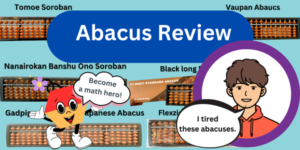With summer just around the corner, many parents seek enriching activities to give their children a head start for the new academic year. If you’re looking for a fun and effective way to boost math skills, please consider giving abacus learning a try. Here are reasons why summer is the best time to start learning abacus:
-
Introduction to a New Tool: For many children, using an abacus as a calculator will be a brand-new experience. At first, all the beads may look the same, making it difficult to see how numbers are represented or how to use the abacus effectively. They need to understand that the abacus operates on a place value system and become familiar with this new tool. Learning the abacus is a fresh and engaging activity. Children often enjoy the tactile experience of working with their hands, making it an exciting new challenge. However, it also requires time and patience to grasp how it works.
-
Time to Overcome Initial Obstacles:
While starting with the abacus can be enjoyable, children will soon encounter their first challenges with addition and subtraction, specifically the 5-complement. This involves using the upper bead, which represents the value of 5. For instance, when adding 3+4 on the abacus, you move 3 lower beads up towards the horizontal bar. To add 4 in the same ones column, you’ll notice there’s only 1 lower bead left, making it impossible to add 4 directly. Here, the upper bead “5” comes into play. You can borrow it, but you need to subtract the excess (since you added 5 but only needed to add 4, the excess is 1). Calculating this excess each time can be tedious, which is why the friend approach is used to efficiently handle the 5-complement.
Subtraction uses the 5-complement in a different way, which adds another layer of complexity. After mastering the 5-complement, children will face the 10-complement (carrying over or borrowing), which can be even more confusing. These concepts are tricky, and summer provides the ideal time to practice and overcome these hurdles.
-
Establishing a Routine:
One of the key factors in achieving success with the abacus is regular practice. In abacus schools, students typically attend classes once or twice a week for sessions lasting 75 minutes (advanced learners may stay for 2 hours!). During these sessions, they work diligently on their practice workbooks. I’ve seen young children struggle with sitting quietly and focusing on the abacus in class. They also practice abacus at home every day. While it may be challenging for young children to sit and focus for 75 minutes, this routine is common in abacus schools. It not only helps them learn the abacus but also teaches them focus and perseverance.
Practicing the abacus every day, even for just 15 minutes, can make a significant difference. Without the constraints of school schedules during the summer, kids can establish a consistent practice routine more easily. The extra time allows for more frequent and longer practice sessions, which are crucial for mastering the abacus.
-
Parental Support:
As I mentioned earlier, young children or abacus beginners need ample time to get comfortable with the new abacus. Parental support is another crucial factor in abacus success. Parents can motivate their kids, set up practice schedules, encourage regular practice, and preferably provide feedback when needed. For instance, if children get stuck on a problem, it’s ideal for parents to offer immediate feedback. From my experience, this support is vital for abacus success.
Summer provides plenty of opportunities for parents to engage and support their child’s learning journey. That’s why I recommend parents learn abacus as well. It’s not difficult, and you will understand it soon once you watch my abacus tutorial videos or visit my website. I plan to videotape the answers to common problems so that you can provide accurate feedback when your child needs it.
So, as summer approaches, consider introducing your child to the fascinating world of abacus learning. It’s a fun, effective, and rewarding way to boost their math skills and set them up for success in the new academic year and beyond. Happy learning!




